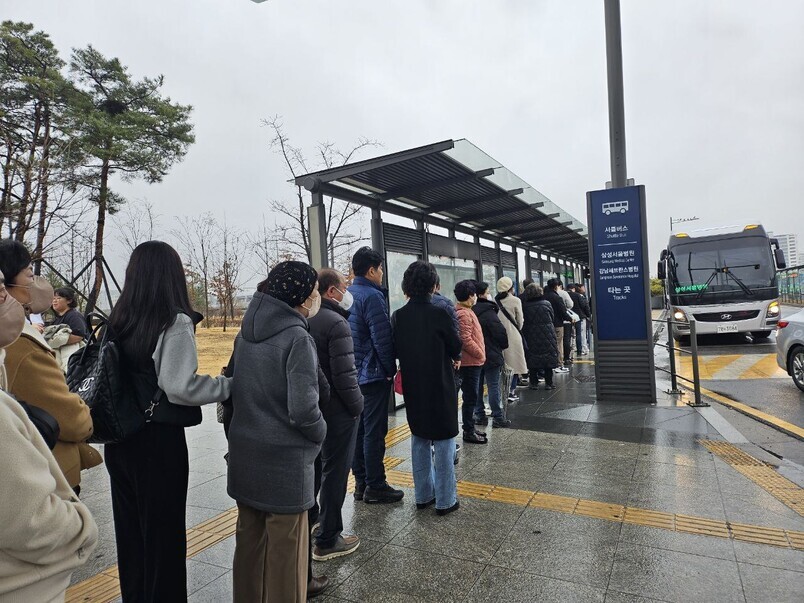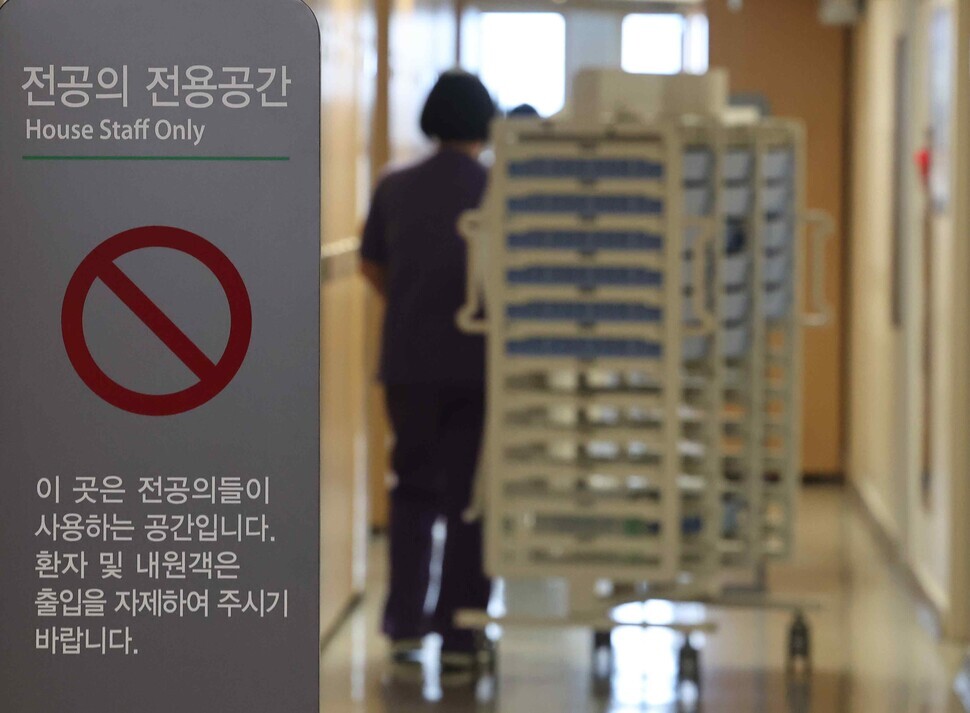hankyoreh
Links to other country sites 다른 나라 사이트 링크
Amid mass resignations at Korean hospitals, the ill and their caretakers worry about delayed treatment

“Our son has a severe disability caused by a brain injury, so we wanted to have him in inpatient care. When all the major hospitals said he couldn’t be admitted, we came to Severance. But they told us that since all the trainee doctors are gone, he can’t be admitted right now and aren’t sure when that will be possible. We have to wait at home, which is just nerve-racking.”
On Monday, numerous patients and parents inb the waiting room at Severance Hospital, in Seoul’s Seodaemun District, expressed worries about the gap in medical care that will result if trainee doctors at Korea’s “big five” hospitals — Seoul National University Hospital, Asan Medical Center, Seoul St. Mary's Hospital, Severance Hospital and Samsung Medical Center — collectively resign on Tuesday as they’ve promised to do in opposition to the South Korean government’s plans to create more placements at the country’s medical schools. Interns and residents at Severance Hospital submitted their resignations in mass a day early, on Monday.
Unable to receive the level of care once provided
“The children’s hospital told us they won’t be providing normal outpatient care for the time being because the trainee doctors have resigned collectively. They said that kind of care should be available in May,” said Kim Mi-jeong, aged 40, the mother of a 5-year-old child with a severe disability.
“I’m so anxious and nervous because I don’t know when my child’s condition might deteriorate.”
“We live in Bucheon, but our child is in critical condition, so we cannot get treatment at any nearby hospitals,” said Cho Hyeon-woo, 35, the legal guardian of a child suffering from a potentially incurable disease.
“We have no choice but to go to the Sinchon Severance Hospital. I understand the position of the doctors, but we have no idea when our child will need another emergency operation, so I’m very worried,” Cho added.
On this day, all house staff working in the pediatrics department of Severance Hospital tendered their resignations, with the exception of fourth-year residents. The door to the residents’ office at the pediatrics department’s ward for critical patients was firmly shut when the Hankyoreh’s reporters paid a visit on Monday.
Even patients who have already received their operations are worried.
“I heard a doctor tell other patients that they were lucky that their surgeries were scheduled for today, as surgeries will be delayed starting tomorrow,” said one patient who recently received a cardiovascular operation, who declined to give their name.
The convalescent is worried about not being able to get the proper post-surgical follow-up care.
Lee Jin-wook, 52, who recently underwent brain surgery, said, “Patients and their families all around the ward keep saying that their operations have been postponed.”
“It looks like they’re pushing back all non-essential operations.”
Patients and families at the other “big five” hospitals in Seoul, which are expecting a wave of mass resignations from residents, are also concerned.
“Wait times for consultations and treatments are around 30 minutes longer than usual,” said Kim Yeong-suk, a parent in her 40s, whose 17-year-old daughter receives treatment at Asan Medical Center four times a week.
“They even told us to come only twice a week now,” Kim added, saying she’s feeling the effects of the medical strikes and resignations.
“I hope they can sort things out through talks,” she said.

Long lines of patients arriving from across Korea to receive treatment in Seoul
Patients who live outside the capital area and regularly travel to Seoul for treatment are particularly concerned.
“Originally, we scheduled an operation for the beginning of March. But the strike has pushed that back to the end of March,” said Cho, 44, a resident of Gyeongju, North Gyeongsang Province. Cho’s father is being treated for esophageal cancer at Gangnam Severance Hospital.
“We tried contacting other hospitals, as my father needs his operation as soon as possible, but they all turned us down,” Cho added.
“My father managed to get his first session of checkup today, but the operation schedule really concerns me. The patients really have no choice or power,” he said.
“Fortunately, there were no problems today, but I was continually worried that my outpatient treatment would be canceled, especially because I have to travel so far,” said Cho Min-ju, 40, a resident of Yangsan, South Gyeongsang Province.
Lines of patients awaiting the shuttle for Samsung Medical Center are getting longer. The patients ride the SRT high-speed rail line from the provinces to Seoul and then hop on the shuttle at Suseo Station.
“The medical care in Daejeon is limited, so I have to come to Seoul,” said an individual surnamed Jeon in their mid-70s, who has been receiving follow-up care for the past 18 months following an operation for kidney cancer.
“I have a post-surgical examination scheduled to check the cancer’s progress, and that fortunately hasn’t been canceled,” Jeon said, expressing his worries.
House staff at the five major general hospitals in Seoul had moved to discontinue their work as of 6 am on Tuesday.
Units of 20 police officers each have been stationed at nine hospitals around the country, including Severance in Sinchon and Hanyang University Hospital, to respond in the event of physical altercations or other contingencies.
By Kwak Jin-san, staff reporter; Kim Chae-woon, staff reporter; Yoon Yeon-jeong, staff reporter
Please direct questions or comments to [english@hani.co.kr]

Editorial・opinion
![[Column] Tariffs on China: Trump was dumb, Biden dumber [Column] Tariffs on China: Trump was dumb, Biden dumber](https://flexible.img.hani.co.kr/flexible/normal/500/300/imgdb/original/2024/0520/191716191153918.jpg) [Column] Tariffs on China: Trump was dumb, Biden dumber
[Column] Tariffs on China: Trump was dumb, Biden dumber![[Column] What if Seoul took reunification by force off the table? [Column] What if Seoul took reunification by force off the table?](https://flexible.img.hani.co.kr/flexible/normal/500/300/imgdb/original/2024/0520/3017161928630494.jpg) [Column] What if Seoul took reunification by force off the table?
[Column] What if Seoul took reunification by force off the table?- [Editorial] Intensifying US-China rivalry means Seoul must address uncertainty with Beijing sooner than later
- [Column] When ‘fairness’ means hate and violence
- [Editorial] Yoon must stop abusing authority to shield himself from investigation
- [Column] US troop withdrawal from Korea could be the Acheson Line all over
- [Column] How to win back readers who’ve turned to YouTube for news
- [Column] Welcome to the president’s pity party
- [Editorial] Korea must respond firmly to Japan’s attempt to usurp Line
- [Editorial] Transfers of prosecutors investigating Korea’s first lady send chilling message
Most viewed articles
- 1Xi, Putin ‘oppose acts of military intimidation’ against N. Korea by US in joint statement
- 2Kim Jong-un wanted to meet with residents of shelled Yeonpyeong Island in South, Moon recalls in mem
- 3To weigh costs and benefits, Korea must stop treating US troop presence as a sacred cow
- 4[Column] What if Seoul took reunification by force off the table?
- 5Berlin mayor hints at tearing down ‘comfort women’ memorial in city
- 6[Editorial] Transfers of prosecutors investigating Korea’s first lady send chilling message
- 7[Column] Tariffs on China: Trump was dumb, Biden dumber
- 8[Exclusive] Truth commission to seek additional murder charges for figures behind 1980 Gwangju massa
- 9KEPCO undergoes repairs for cracks in nuclear reactor containment buildings in UAE
- 10‘Shot, stabbed, piled on a truck’: Mystery of missing dead at Gwangju Prison